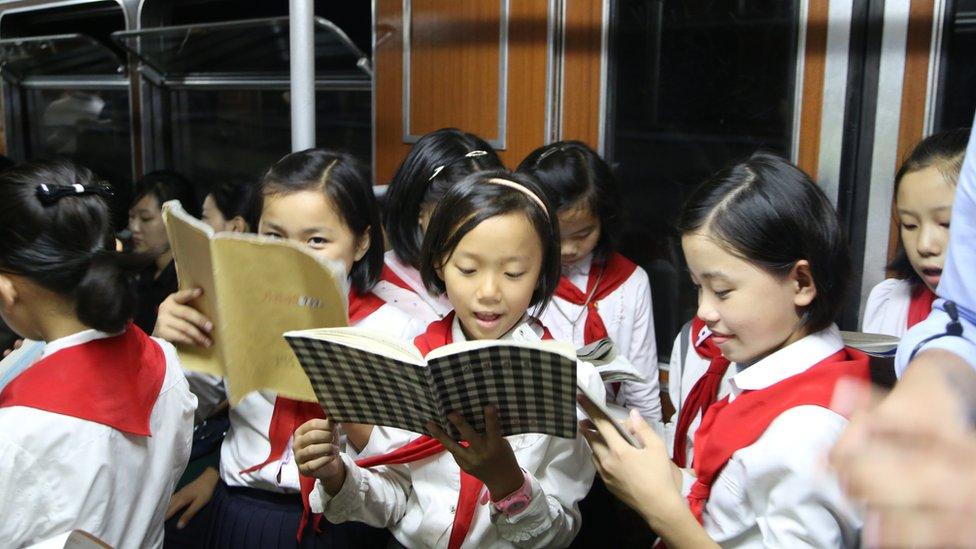Inside the world's most secretive country
- Published

A group of "young pioneers" on the way home on the Pyongyang metro
While global headlines are dominated by Donald Trump and Kim Jong-un threatening mutual destruction, daily life in North Korea is continuing almost as normal.
Photos taken in September during a visit by a team from show people going about their lives. Only here and there do the effects of sanctions or the anti-US propaganda sneak into the frame.
These North Koreans are having a picnic near the Ullim waterfall near the port city of Wonsan. With food, beer and karaoke, there's nothing to suggest tensions are having any impact on the mood.
These students at a children's camp are sporting bright tracksuits - which if you look closer, all bear the logos of Western brands like Nike or Adidas. Presumably they are copies and the children are most likely not aware of any Western brand image behind them.
This big passenger ferry used to connect Wonsan with the Japanese port of Niigata. Yet due to sanctions imposed in 2006, the ferry service got shut down. That means the vessel has for years been moored in Wonsan, but remarkably still has a crew.
Clams are a very popular treat especially in the country's coastal cities. Most of them are normally destined for export and not for the local population. Since the latest round of UN sanctions in early August banned all exports of seafood, they might now be more available again on the local market.
For a long time, electric bikes imported from Japan or China were only to be found in the capital. But increasingly, they can be spotted also in smaller cities, possibly suggesting that economic development outside Pyongyang is slowly picking up.
But transport often remains extremely basic. Many cities have countless bicycles and here, a man is using an ox-pulled wagon to transport piles of old cardboard for recycling in the city of Hamhung.
The woman in the centre in the next picture has a plastic bag from Japanese-Chinese budget brand Miniso. According to North Korea watchers NK News who provided the photos, Miniso opened the first ever foreign brand store in the capital this spring. Because of tougher sanctions though, the store has since changed its name.
While life largely appears to be continuing as normal, there are signs that the long period of sanctions is taking a toll. Some petrol stations are closed and power shortages have led to people installing small solar panels outside their apartment windows - as can be seen on this apartment tower near the southern border city of Kaesong.
Despite the economic difficulties, the propaganda machine continues to roll. Each year, the Day of the Foundation is celebrated with a mass dance in the capital. This young woman is getting ready for the performance.
The perceived threat from the outside is always present. There are anti-American banners with patriotic slogans, and government guides take visitors to the so-called Victorious Fatherland Liberation War Museum. Despite the tensions, there are enough smiles to go around.
North Korea insists it remains ready for war at any time. Below, one of many tank traps stands on the side of a highway. The concrete structure has explosives at the bottom which in case of an invasion will make the huge structure collapse onto the road to block enemy tanks. In the days of intercontinental missiles and nuclear tests, these traps seem archaic yet serve as a reminder of the possibility of war.
All the images are from , a specialist publication on North Korea. During any trip to the isolated country, pictures can only be taken with the approval of government guides who are always present.
- Published28 September 2017
- Published27 September 2017
- Published26 September 2017